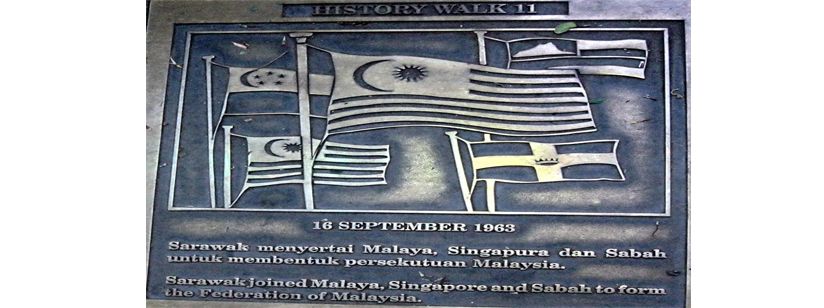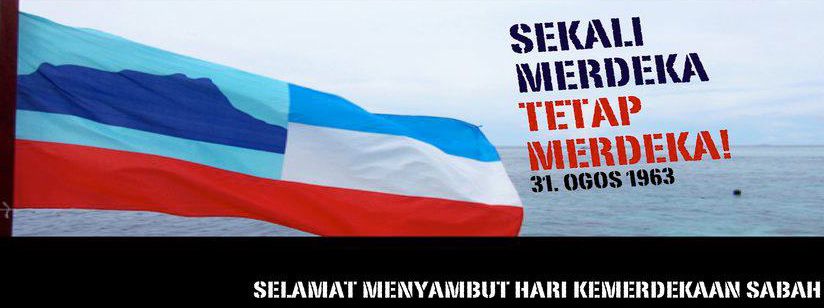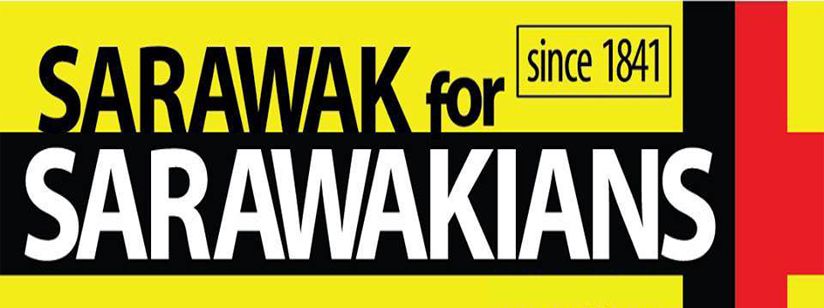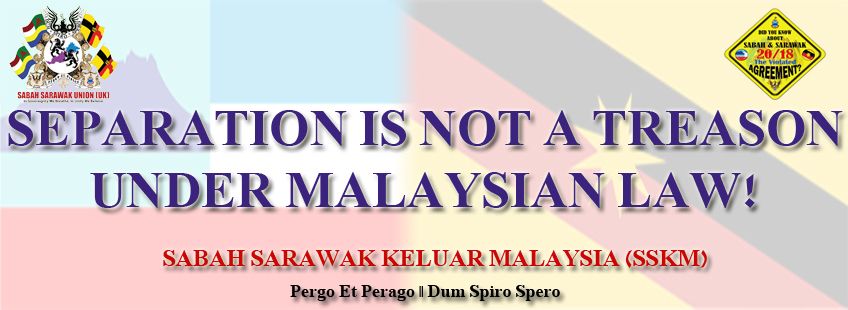Sunday, 28 June 2015
Sunday, June 28, 2015
Agreement of Malaysia
,
Exposing the Truth
,
Fact
,
Federation of Malaysia 16 September 1963
No comments
PERJANJIAN MALAYSIA 1963 SEPERTI YANG DITAFSIRKAN DI BAWAH UNDANG-UNDANG CONTRACT MALAYSIA 1950
MALAYSIAN AGREEMENT 1963 AS INTERPRETED BY THE MALAYSIAN CONTRACTS ACT 1950
Section 52:
When a contract consists of reciprocal promises to be simultaneously performed, no promisor need perform his promise unless the promisee is ready and willing to perform his reciprocal promise.
(Apabila sesuatu [perjanjian] kontrak itu mengandungi janji-janji bersaling yang mana perlu dilaksanakan serentak, PEMBUAT JANJI TIDAK PAYAH (diulangi, Tidak Payah) MELAKSANAKAN JANJINYA kecuali PENERIMA JANJI PUN BERSEDIA DAN INGIN MELAKSANAKAN JANJINYA JUGA)
Section 38:
The parties to a contract [agreement] must either perform, or offer to perform, their respective promises, unless the performance is dispensed with or excused under this Act, or of any other law.
(Semua pihak [perjanjian[ kontrak mesti melaksanakan, atau, menawarkan untuk melaksanakan, janji-janji mereka masing-masing, kecuali perlaksanaan itu tidak diperlukan atau abaikan di bawah Akta tersebut, atau undang-undang lain)
Why should you support the independence of Catalonia?
In the last 200 years, the world has seen lots of new countries being born. Most of them became independent after a civil war, others as a result of WW1 or WW2. Very few, like Iceland, can be proud to have achieved independence through a democratic process. Thus, if we preserve a bit of historical perspective, we must admit we have been experiencing an adjustment of the frontiers to cultural and regional borders for over 200 years. Just remember that as a result of WW1 Poland, Austria, Hungary, Czechoslovakia, Yugoslavia and Estonia were formed, and Poland had been previously a kingdom on its own before being part of the German Prussian empire.
Decolonization and civil wars also produced countries like Canada and USA, South Africa, Brazil or Mexico. But after WW2 the list of countries gaining independence became even bigger: over 25 countries, including China, Tunisia, Iceland, Philippines or Ireland. And during the last part of the XX century we saw Czech Republic and Slovakia becoming two separate countries, Bosnia & Herzegovina, Serbia, Montenegro, Kazakhstan and even the island of Palau became independent from the USA in 1994. Therefore, we must comprehend that this is an ongoing tendency, being Kosovo the last one in 2008.
However there is one state in the European Union with a government unwilling to free up their last colonies: Spain. I am not going to explain again how Catalonia or the Basque country became part of the Spanish empire hundreds of years ago. Let me just remind you it was against the will of the people. Now Catalans we found ourselves looking at history and not understanding why some educated people from Brazil may not understand why Catalan people want their independence, did they not get it themselves? Why the Dutch people do not support Catalonia efforts, when their nation was submitted to the Spanish kings once and they were freed, supported by the British, as they were freed from Nazis just last century? Why a French person, whose family fought for freedom, equality and fraternity, are obtuse to see the reasons why we Catalans are doing what we are doing lately to get out of the Spanish false democracy and form a new true democratic state within the European Union?
As explained through this blog, there are several reasons, some cultural, some historical, and others socioeconomic. But there is a very important reason I would like to point out here: we Catalans do not live in a democratic state. Our rights as citizens in this world are diminished every day, our historical memory is silenced, our taxes used for corrupted politicians to spend their vacations in Fiji, our cultural heritage damaged and insulted, our freedom to choose our political representatives is diminished through censorship and demagogy, our rights as workers and employers plundered, favoring nepotism and corruption to all levels. Spanish politicians have tried to slander our process towards independence by saying we are doing apology of fascism, while they are precisely Franco’s heirs, the ones willing to forbid again Catalan in schools or overruling our right to vote, like they did for 40 years of dictatorship last century.
We would like to become a free new state with improved laws and tax system. With the 22,000 millions of Euros the Spanish government never returns to Catalan people, though they should according to their own laws, we could get so many people out of poverty. So many families would have their present and future improved in all areas: public health, education, social care…
So, it does not matter where you live or where you are from, if you are out there in the world and believe in democracy, please give support to the Catalan process. If you believe in the principles described in the letter of human rights, if you believe all nations have their right to self-determination and all people should be free and have right to vote to decide; if you believe in freedom of thought and expression and if you believe your country improved after gaining independence, please support Catalonia’s right to independence.
Sunday, June 28, 2015
Agreement of Malaysia
,
Exposing the Truth
,
Fact
,
History
,
Sabah
,
Sarawak
No comments
Sabah and Sarawak's right to say 'Sorry, no entry'
QUICK TAKE: The power to say, “Sorry, no entry” to anyone, including Malaysian citizens, into Sabah or Sarawak rests entirely in the hands of the director of immigration of these Borneo states who is to comply with the direction of the “State authority” which in effect means the chief minister.
The latest victim of this special immigration power, granted to the two states since the formation of Malaysia in September 1963, happens to be Seputeh Member of Parliament Teresa Kok who was denied entry when she landed at the Sandakan airport after a flight from Kuala Lumpur on Feb 4.
As usual and expected, there are protests over the incident but to no avail, because the state concerned does not even have to give a reason or explain such an action.
For, under Section 65(1)(a) of the Immigration Act 1959/63, the state authority in Sabah or Sarawak has the right to restrict or cancel a permit, pass or certificate of anyone wishing to gain enter into that state.
This is a law applicable only to the East Malaysian states in recognition of the fact that immigration control was one of the top safeguards requested by Sabah and Sarawak leaders and this point was duly incorporated into the Immigration Act 1959 that was accordingly amended by Parliament in 1963.
In the months prior to the formation of Malaysia, there were genuine fears of people in Sarawak and Sabah that Malayans who were more advanced in education, commerce and industry, would flock into their states in large numbers and take away employment and other opportunities from the locals, considered as unfair competition then.
Over half a century down the line, this law is still firmly in place and from time to time the chief minister concerned would use it to bar the entry of individuals considered by him to be undesirable to the state, including leaders of opposition parties, like Teresa Kok.
And no one could do anything about it, not even the prime minister.
Last November when Negara-Ku Patron Datuk Ambiga Sreenevasan was denied entry into Sabah she described the ban as ridiculous saying, “I don't know what they are paranoid about in this day and age. These types of restrictions are meaningless, when there are other ways to go about it.”
She had suffered a similar restriction in April 2011 when disallowed to enter Kuching and put on the next flight back to Kuala Lumpur, her port of origin. She took the matter to the High Court in the nation's capital and was told by the court there that it had no jurisdiction to hear a Borneo case and dismissed her application.
Another who had a similar experience was PKR vice-president Tian Chua, who was denied entry into Sabah by the immigration authority in April 2013 and forced to take the next flight back to Kuala Lumpur the same day.
The display of this special power by the state authority of these two states is not confined only to social activists and opposition personalities, but to academicians as well. In late December last year, controversial academician Ridhuan Tee Abdullah was barred from entering Sarawak upon arrival at the Kuching International Airport.
Sarawak Immigration Department deputy director Hamfatullah Syawal Hamdan confirmed to Bernama in a report that his department had received instructions from the Chief Minister’s Office to stop Mohd Ridhuan from entering the state.
Mohd Ridhuan was scheduled to deliver a religious talk at the Lundu District Mosque. A source told Bernama that Chief Minister Tan Sri Adenan Satem was not in favour of Ridhuan's presence in Lundu and had instructed that the event be cancelled.
Two years ago, PKR vice-president Nurul Izzah Anwar was denied entry into Sabah because she was heading for an event in conjunction with the state level Kaamatan (harvest) festival in Penampang, near the state capital.
State Secretary Tan Sri Sukarti Wakiman explained in early June 2013 that the ban on Nurul Izzah was only for a single occasion, which was on the eve of the closing ceremony of the state level Kaamatan celebrations on May 30. He said the decision to bar her entry was done for security reason.
“There is no permanent ban on her or any other opposition leader coming into Sabah as long as they do not pose a security threat,” he was reported to have said then.
According to Sandakan Member of Parliament Stephen Wong, who was at the airport to receive Teresa Kok on Wednesday, the latter was scheduled to attend and witness the installation of DAP Sandakan Wanita wing that night.
In what way could the Seputeh MP be a security threat then?
Apakah Peluang Filipina Untuk Menuntut Sabah?
Sekiranya Kes Ini Dibawa Ke Mahkamah Keadilan Antarabangsa (ICJ)? Tidak ada.
Pertama, undang-undang antarabangsa yang ditadbir oleh ICJ menolak tuntutan kedaulatan berdasarkan semata-mata kepada hak milik bersejarah (historic title), selepas referendum atau pungutan suara dilakukan.
"Modern international law does not recognize the survival of a right of sovereignty based solely on historic title; not, in any event, after an exercise of self-determination conducted in accordance with the requisites of international law, the bona fides of which has received international recognition by the political organs of the United Nations".
Undang-undang antarabangsa moden tidak mengiktiraf kemandirian hak kedaulatan yang berdasarkan semata-mata kepada hak milik bersejarah; tidak, dalam apa juga peristiwa, selepas penggunaan hak penentuan diri (self-determination) dilakukan mengikut keperluan undang-undang antarabangsa, bona fide yang mendapat pengiktirafan antarabangsa oleh badan-badan politik Pertubuhan Bangsa-bangsa Bersatu.
Kedua, kerana waris Sultan Sulu telah menerima ‘cession money‘ sehingga ke hari ini. Ini bermakna waris Sultan Sulu mengakui bahawa Sabah telah diserah (ceded), dan bukannya dipajak (leased), kepada British North Borneo Company.
Ketiga, kerana Kerajaan Filipina telah berhenti mengiktiraf Sultan Sulu sejak kemangkatan Sultan Mohd. Mahakuttah A. Kiram pada tahun 1986.Geran yang dijadikan sumber konflik telah ditandatangani oleh Sultan Sulu, Sultan Jamalul A’lam dengan Gustavus Baron de Overbeck serta Alfred Dent, yang mewakili British North Borneo Company, pada 22 Januari 1878.
Keempat, geran yang ditandatangani antara British North Borneo Company dan Kesultanan Sulu itu telah diatasi oleh Protokol Madrid 1885. Sepanyol, yang menguasai wilayah-wilayah Kesultanan Sulu ketika itu, telah menandatangani perjanjian dengan Jerman dan Great Britain pada 7 Mac 1885 untuk melepaskan segala tuntutan terhadap kedaulatan Sabah. Article 3 The Spanish Government relinquishes as far as regards the British Government, all claim of sovereignty over the territories of the continent of Borneo which belong, or which have belonged in the past, to the Sultan of Sulu (Jolo), including therein the neighboring islands of Balambangan, Banguey and Malawali, as well as all those islands lying within a zone of three marine leagues along the coasts and which form part of the territories administered by the Company styled the ‘British North Borneo Company’.
(Kerajaan Sepanyol melepaskan kepada Kerajaan British, semua tuntutan kedaulatan ke atas wilayah-wilayah benua Borneo yang dimiliki, atau yang telah dimiliki pada masa lampau, oleh Sultan Sulu (Jolo), termasuk pulau-pulau Balambangan, Banguey dan Malawali yang berhampiran, dan semua pulau-pulau yang berada di dalam zon tiga liga marin di sepanjang pesisir pantai dan membentuk sebahagian wilayah yang ditadbir oleh Syarikat yang digelar ‘British North Borneo Company‘.)
Kelima, Kesultanan Sulu dianggap telah tamat sebaik sahaja Sultan Jamalul Kiram II menandatangani Perjanjian Carpenter pada 22 Mac 1915, yang menyerahkan segala kuasa politik beliau kepada Amerika Syarikat. Keenam, kerajaan Malaysia telah mengambil tanggungjawab untuk membangunkan prasarana bagi kemudahan para penduduk Sabah sejak 1963 tanpa bantahan Kesultanan Sulu mahupun kerajaan Filipina. Ini membuktikan pemilikan dan pentadbiran yang aman secara berterusan oleh kerajaan Malaysia ke atas Sabah. Mengikut dasar effectivites yang diambil kira oleh Mahkamah Keadilan Antarabangsa (ICJ – International Court of Justice), Malaysia boleh dianugerahkan hak ke atas Sabah, sepertimana yang pernah diberikan kepada kerajaan Malaysia dalam kes Ligitan-Sipadan.
Keenam, laporan Suruhanjaya Cobbold yang dikeluarkan pada 1 Ogos 1962 mendapati bahawa 1/3 penduduk Sabah dan Sarawak menyokong kuat pembentukan Malaysia, 1/3 lagi menyokong projek Malaysia dengan syarat hak mereka dilindungi, manakala kumpulan 1/3 yang terakhir terbahagi antara mereka yang mahukan kemerdekaan dan mereka yang mahukan pentadbiran British diteruskan.
Ketujuh, Setiausaha Agung PBB, U Thant, telah melaporkan pada 1963 bahawa penduduk Sabah “ingin menamatkan status kebergantungan mereka dan merealisasikan kemerdekaan mereka melalui penyekutuan yang dipilih secara bebas dengan bangsa lain dalam rantau mereka” (“wish to bring their dependent status to an end and to realize their independence through freely chosen association with other peoples in their region”).
Kelapan, jika Kesultanan Sulu mendakwa bahawa Sabah adalah milik mereka, maka adalah konsisten bagi Kesultanan Sulu untuk tidak sahaja membuat tuntutan terhadap Sabah semata-mata, malah juga menuntut dan menguasai pusat pentadbiran mereka sendiri di Jolo, selain wilayah Palawan, Semenanjung Zamboanga, Basilan dan Tawi-Tawi di Filipina yang juga mereka dakwa merupakan milik mereka.
***Secara keseluruhan, penerangan ini telah memberikan kefahaman yang sebenarnya. Inilah perkara yang perlu difahami walaupun terdapat perkara yang kurang tepat iaitu pada Poin yang Keenam, tetapi ia akan diulaskan pada artikel yang berlainan***
Sunday, June 28, 2015
Agreement of Malaysia
,
Exposing the Truth
,
Fact
,
Federation of Malaysia 16 September 1963
,
History
,
Sabah
,
Sarawak
No comments
Sabah and Sarawak at 50, ignoring history at your own peril
As we approach the 50th anniversary of the Federation of Malaysia, there will be a lot of articles about three things.
First, Sarawak (and Sabah) did not “join” Malaysia but helped establish the Federation of Malaysia. Second, Sarawak (and Sabah) should be treated as equals, rather than merely a state in the Federation.
After all, Sarawak became “independent” or “self-government” on July 22, 1963 while Sabah achieved the same on August 31, 1963.
Third, the promise of autonomy in the “20 Points” was never kept. For example, how many of you know that there was supposed to be a review of the guarantees 10 years after Federation? As far as I know there was no formal review in 1973 although some letters were exchanged.
Where you stand on the three things I mentioned above will largely depend on your political leanings. It is also dependent on how well you know your history.
And this is where the problem starts.
In general, Malaysians do not know their history because the “official” history taught in secondary school is a version of history that is supposed to shape you into a Malaysian nationalist, i.e. do not challenge Malay authority. It is not meant to provide an unbiased view of history.
Also, as I understand it, the history textbook was actually written by a historian who also happens to be a supreme council member of Perkasa. Do I need to say more about the sort of history that is being taught in school?
In short, Malaysians know little or next to nothing about Malaysian history and East Malaysians know even less about the history of Sabah and Sarawak.
Each state was unique and before the federation, had little in common with the peninsula. Sabah was ruled for more than a century by a British company while Sarawak was ruled by the White Rajahs, an English family.
I am not here to teach history but rather to question what is being done to document what really happened in the past? For example, the seminal event in Sarawak’s history is the cession of Sarawak to the British in 1946.
Many people, especially the Sarawak Malays, did not want the White Rajah to give away Sarawak to the British.
According to the “official” version, Rosli Dhoby, a young Malay Sarawakian from Sibu, Sarawak, stabbed Sir Duncan George Stewart, the second governor of colonial Sarawak in 1948. He wanted Sarawak to be independent. Rosli Dhoby is hailed as a hero who paved the way for Sarawak to be independent in the federation of Malaysia.
Recent research undertaken overseas suggests something else. I am not going to give you any hints and suggest you listen to the full story here.
I just want to make a simple point - how come there are no Malaysian historians studying their own country in an unbiased way?
Must historians in this country show their “patriotism” by only studying non-controversial things? How come all the interesting bits of history are done by non-Malaysians?
If I am not mistaken, there are four universities in Sarawak and two universities in Sabah. They keep producing ethnography work but little in the way of peoples’ history.
It is as if historians in both states are afraid of telling the world what really happened during colonial and pre-colonial times.
The “official” history is almost never challenged and after 50 years of Malaysia, Malaysians from Sabah and Sarawak only know the history of Malaya. How sad. - September 11, 2013.

































































